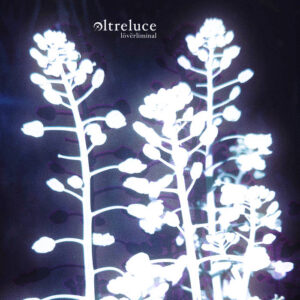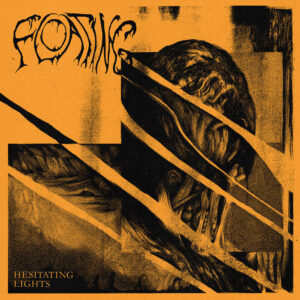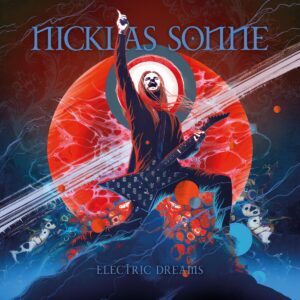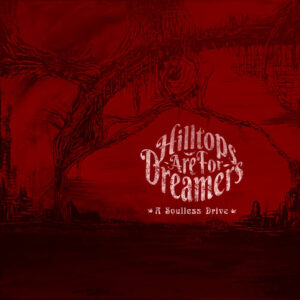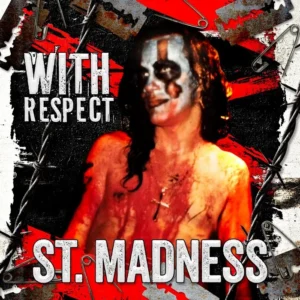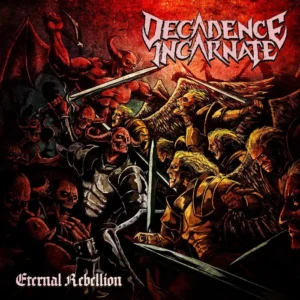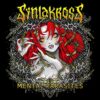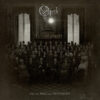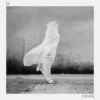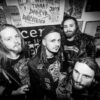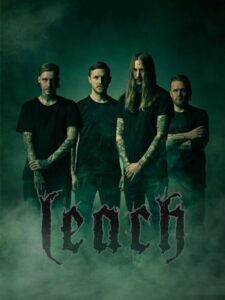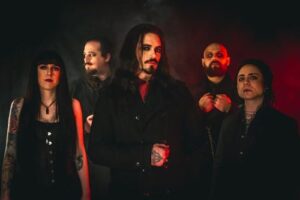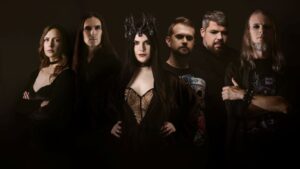Markus Leitner
Irdorath

To be honest, back then we were really young. I was about 18 years old and it was right before I had to go to one-year military service [compulsory for all Austrian citizens between the ages of 17 and 51]. We were for some years Metal fans. When I was 16, I bought my first guitar. We basically found each other through school and friends, and we formed the band. There was very little planning back then—maybe that's why I am the only one left! [laughs]. We were all the same age. It was all before starting our jobs and careers. So, in the beginning it was a lot of noise. It was a good way to spend our free time.
We were all from the countryside. There were not many bands or venues around. You could describe the setting as tiny and honest. It was a good place to start. After some years, we became more and more serious and several of the first members left. It was more like a hobby for them. Again, we were quite young in the beginning.
Over time, new members came in who were more serious about music. Eventually the only original members from 2005 were me and the lead singer, Schnitter. By then we had put out our demo and first two full-length records, which were all in German. After "Dekonstrukteur Des Fleisches," Schnitter left. Since he was also in charge of writing the lyrics, my brother Thomas (drums) and I took over the lyrics. I also took over the vocals. It was then that we became more serious about our music, and we could plan more about the direction we wanted to go.
Musically we always knew we wanted to focus on Black Thrash, but we had a lot of discussion as a band about what we wanted to write about, what we wanted to address. We were never that kind of academic or Shamanistic Black Metal band. We decided to make some kind of reflection about our culture (which is Christian) — what we were taught in schools and what was believed by the general institutions of our society.
As I mentioned, we wanted to make a reflection about our culture. We thought, why not take the main character of this whole fairy tale that our culture is wrapped up in. We thought, "Who was that main character?" Like Frodo in the Lord of the Rings, who did things center on? This, of course, was Christ of the Christian Bible. We said, "Okay, let's reflect his life and how it could be different if it wasn't written in this romanticized book, the Bible, but if it was in modern culture." For instance, Mary comes to Joseph and says, "Hey, I'm pregnant but you aren't the father. And by the way, it wasn't some neighbor, it was a ghost." We tried to imagine how that would go over today. If that happened to Joseph in modern times, I think it would have driven him mad. And that became the topic for the song "God Raped" on "I Am Risen."
With "I Am Risen" we focused on the life span of Jesus Christ, including the world that surrounded him. With "Denial of Creation" we focused on the present time and a little bit forward with emphasis on the shifts in technology over that 2,000-year span. For instance, back then people killed each other with swords, spears, and such . . . not much damage to the world. One man killed another man, and that was war. Now compare that to present day with atomic war and all that shit. If Jesus were alive today, he would look around and say, "Okay, they believe in God and they have religion, but they still do all this shit to each other and to the world. No learning effect; only mass destruction." That was the idea of "Denial of Creation."
With "The Final Sin" we thought, if Christ were to look at the world 200 years ago, present time, and into the future, he would see no one learning despite, or because of, religion and all the institutions behind religion and such beliefs. He would maybe come to one conclusion: For people to grow and get into a better life, there would be to need to be the final sin — and that final sin would be to erase the divine. Also because of all the technology and science we have right now, people have not gotten smarter, they have gotten worse. Maybe the world would be a better place and people would have a better chance without institutional belief systems — that was the idea of the trilogy.
Yeah, the band has talked already about this. Throughout the writing of the trilogy this idea has occurred to us again and again that we have all this science and technology and we are really sometimes shocked how the institution of religion (all religions, not just Christianity) has grown and has too much power. This may be a theme for us in the future, this incongruity between the two sides, science and religion.
In the beginning we were only Metal fans—you know, eighteen years old, metal, metal, metal. Back then our main influences were from Metal music, all the genres and the overall Metal scene. Now, fifteen years later, I would say Metal continues to be our main influence in our songwriting and what we do as musicians, but as normal human beings it is not possible to only listen to heavy music all the time. You listen to the news and there is music afterwards, you go to other shows, there is music everywhere and it is not always Metal. I try to be open-minded to all the other music and if the song is good, it is good. It doesn't matter if it is pop, R&B, or Metal.
I would say my general inspiration comes from the Metal scene, but I try more to be influenced from our own music than from other bands. By this I do not mean regional or subgenres of Metal, but our own music as a band. What did we learn during the last album, what did we discover, what did we really like that we want to explore further?
I'm not sure what other people would say about their songwriting process, but for us we try to be inspired by ourselves — what were our strengths in the past, what were our weaknesses, where should we put more focus on. Of course, it is impossible not to be influenced by other bands or songs you hear, but we never listen to another band and try to mirror that sound. That is not how we do it at all. I think that would destroy my fondness for writing music.
I knew the answer to this question the first minute I read it [laughing]. Somewhere I still have this cassette from when I was five, six, seven years old. It was MICHAEL JACKSON's "Dangerous." I can remember — actually, I don't know if it is my own memory or just the memory of my parents telling this story so many times! — but I remember hearing the song on the radio and then I wanted to learn English because I wanted to know what this word meant! And then my parents bought me the cassette. I know I still have it somewhere. And no matter what people say about MICHAEL JACKSON, I think he was a great musician.
It was not complicated to get the album out because we had the great support of Art Gates Records. What was complicated was the discussion we had about whether we should release the record or not because it was clear that the pandemic would go on and maybe even get worse and worse.
The band and Art Gates Records had the same thought: Should everybody now stop making music, art? What would happen then? Everyone would cancel everything and then half a year or a year later you have four times more music coming out.
Then we thought, well, during the pandemic you want something new. Well, of course, we had to cancel all our release and touring plans, but the music is the music. We can play our shows later. I think the fans and listeners know how the pandemic is affecting things, and they know all the bands will do their release shows later. And we are one of those bands.
MARKUS: Maybe because this album is still very fresh — you know, you always believe your own children are the most beautiful — I am still in that period that I like the whole record. When your children get older and they start crying and running around screaming and making a mess, maybe then you are no longer that happy with them, but when they are babies, they are all nice. That's where I am with the new album right now.
I still really like the sound we created with Hertz Studio in Poland. We tried to make a mix of natural but still modern touch. Thomas and I worked really hard on the songwriting. We discussed every line and every word of the lyrics, and we learned a lot through the entire production process.
As far as cover art, since "Götterdämmerung" we have always used our own ideas that the artist then creates for us. For "The Final Sin" we had Jan Yrlund (who did the covers for "I Am Risen" and "Denial Of Creation") do some drawings for us in his style. When we looked at them, though, we felt we had something different in mind. We wanted something more dramatic, more pure.
We then looked at a lot of art from Greek and Roman culture and decided we wanted something painted or carved instead of digital. After a lot of discussing and searching we came to meet Giannis Nomikos (GN Art - Startseite | Facebook). He showed us his artwork which was all rendered in pencil on paper — no computer graphics, just pencil and paper, nothing more. We were very impressed. We then discussed the ideas that we had in mind and shared the lyrics and music with him. From there he developed an initial rendering and we fell in love. It was exactly what we had in mind. We were the first band he ever worked with and, based on how well it came out, I don't think we will be the last.
The video for "Chains Of Virtue" is different from your typical videos, giving fans a rare behind-the-scenes view of the band. There's footage of the band playing video games, playing with a cat, and generally just hanging out. Why did you decide to make such a different video? What has been the reaction from fans?
We knew for a long time that we would do something like this. We were a little bit tired of all these "we are so Satanic and we are also are Shamanistic" and "we love nature and everything is a ritual" videos from all these bands that once you get to know them, before shows or after shows, you find out they are all normal people who drink their beers just fine and believe that all lives matter and have lovely wives at home.
So, we decided to make this studio video as we are. We just turned on the video players and started capturing footage of us at Sound Delusion Studio in Austria where we did the recording as well as Hertz Studio in Poland where we did the mixing. When we were done mixing the album, we looked back at all the video material we had. We thought, "Yeah, hey that's really funny." We saw that we had a lot of these really lovely moments, and we thought why not make this video without any fake ritual stuff.
The reaction from viewers has been really, really good. We first thought the "true Black Metal police," as we call them in Austria, would say a lot against it, but that has not been the case.
The cat? The cat belongs to the owner of Sound Delusion Studio. He has been a big supporter of ours from the beginning. The cat's name is Rob Zombie. The studio owner is a big ROB ZOMBIE fan.
We all live quiet and normal lives. Thomas is finishing his studies. The rest of us work full time. Music takes a lot of time. After work, life, and music there is not that much time left for hobbies.
Yes, it is a big decision. If you want to make a living playing Metal music, you have to devote your whole life to it. The only way you earn money is on stage. If you tried that from the beginning, you would have to have a lot of money of your own. Most Metal bands make a living through their regular life activities.
Yes, when we recorded "The Final Sin" we also re-recorded the whole "Gotterdammerung" LP as well as a song we wrote back then for an Austrian magazine that we never released. We re-recorded all eight songs plus the bonus track. Because of the pandemic, the release has been delayed. We will hold it in our pocket probably until the end of the year, maybe winter.
We even managed to get our original vocalist, Schnitter, back in the studio and we share vocal parts. He sings some parts and I sing some parts. It was very fun for us to listen to it again and re-record it. The equipment and technology today are so much better, not to mention the fact that we were eighteen and nineteen years old back then.
I am sure you have plans to tour once things open again. Are there any bands you'd like to tour with?
I really like the Polish extreme scene. We have been for long, long years into bands like VADER and HATE. This was also the reason why we started recording with the Hertz Studio, because those records we loved from VADER, HATE, and BEHEMOTH. So maybe the dream tour would be with VADER and HATE together. But for right now for us, I would say every chance we have to perform live is amazing.
I think the Metal scene will go back to normal. At first there will be a lot of enthusiastic bands that have been waiting to get out. At first there will be a lot of shows. All the bands will start to tour and play again. There will be a lot of shows, new records, videos and people will go to everything. After this burst — maybe weeks, maybe months — it will become too much. The fans who used to go to every show in the past will continue to go; fans that used to just go to some shows every year, will go back to that habit. The big surge of attendance will slow down after a while and things will go back to normal.
Globally, I think a lot of countries will be more focused on safety for the entire population. This global, international life Europeans used to enjoy — being able to easily cross borders and travel to other European countries — I don't know if this will last so long.
Yes, I'd say give it a try. We are living in the 21st century. Our music is available for free on several platforms. You don't have to invest money. Before you used to have to buy music from an unknown artist and if it was shit, it was shit and you were out of money. Today, it is different. Check us out on YouTube, the IRDORATH website, or bandcamp. If you like it, please leave us a post or message. If you really like it, then go ahead and buy our music and merchandise.
More results...
